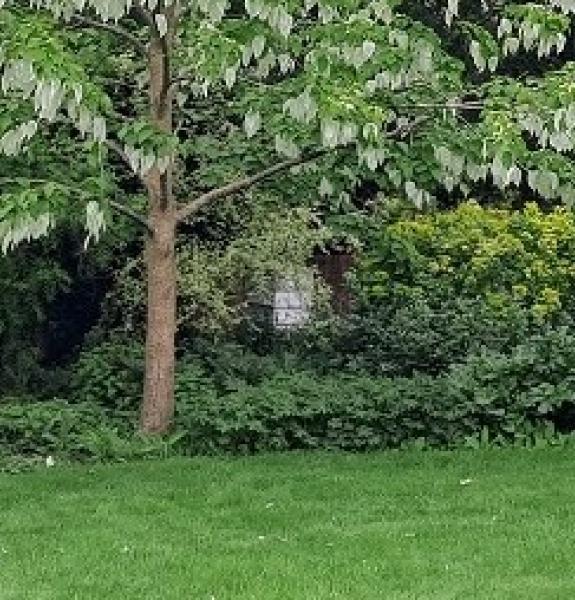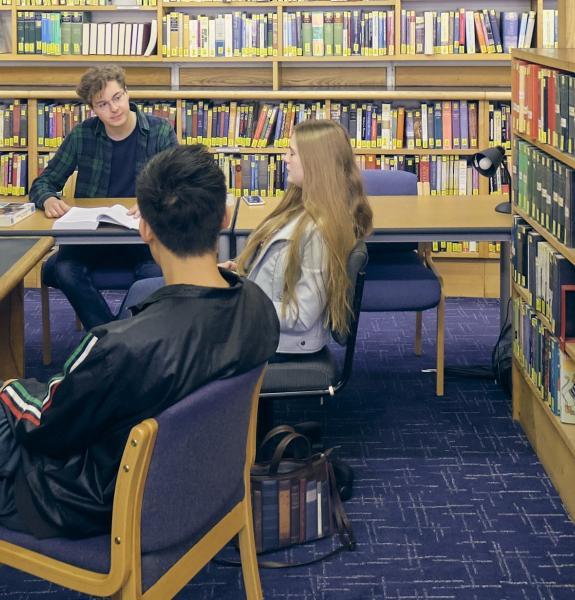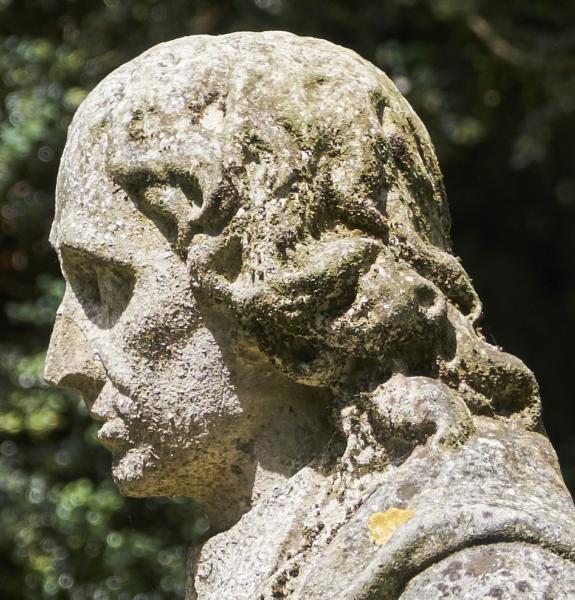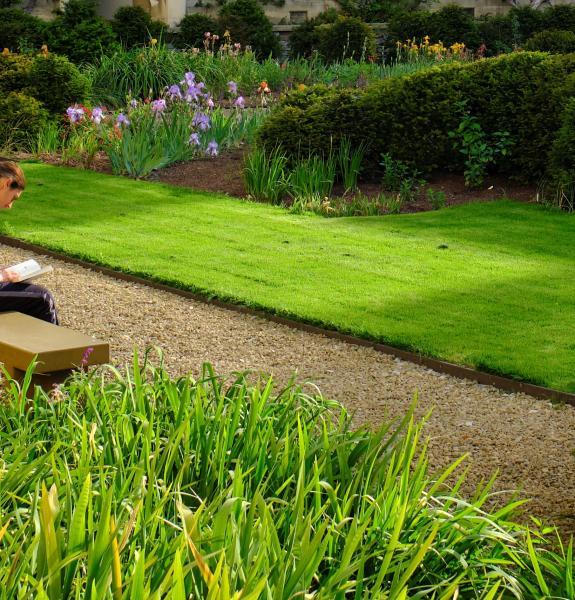"The central location of Christ’s, and its theatre space, made it particularly appealing."
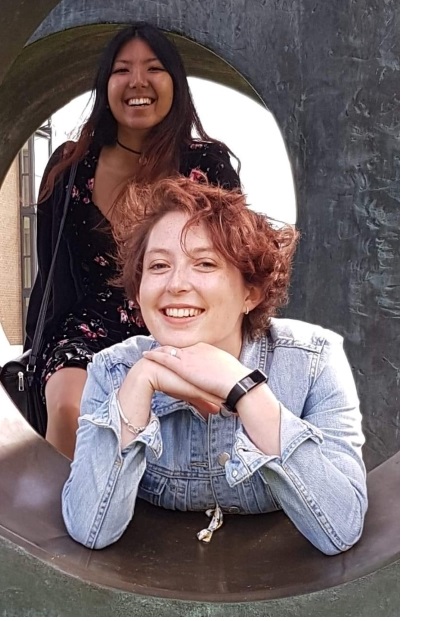
Olivia is from Newcastle, in the North East of England, and wrote this at the end of her first year studying English here at Christ’s College, Cambridge. At school, Olivia did A-Levels in English Literature, History and Maths, as well as an AS-Level in Further Maths.
Why did you choose English at Cambridge?
I love the way we study literature chronologically, from some of the first texts written in English through to the present day, because it allows you to build upon knowledge with each step forward. The supervision system is also a great benefit of the course here, and has really helped me reflect and develop on my work. Supervisions involve meeting your supervisor for about an hour to discuss the work you have been doing throughout the week, usually focused on the essay you will have handed in the day before. Most of my supervisions have been in pairs so far but it is not uncommon to have three people to one supervisor or even one-on-one! The supervisions may be held in your own College, or sometimes in another College, depending on your supervisor. I have really enjoyed having my supervisions in other Colleges, as it gives a bit of variety between terms and means you can be taught by some great fellows from outside your College! Supervisions are not something offered at most other universities and are a really productive way of engaging with your own ideas, discussing them with some of the greatest academics in the specific areas you are studying.
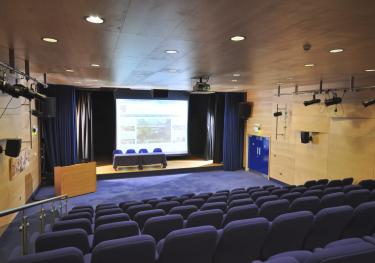
Why did you apply to Christ’s?
To be perfectly honest, a big part of it was that it was first on the list! I researched a few Colleges I liked the sound of, to find out how central they were and what facilities they had. Christ’s central location and its theatre space made it particularly appealing. I settled on Christ’s after reading lots of positive student reviews of it.
In my first year, Christ’s offered a book grant for first-year students which I made great use of, and I also received a little money as a travel grant which acted as a small contribution towards a trip to teach English in rural Nepal. I did not look at the stats for the average number of places on my course, (Christ's takes 6-10 students per year for English) but I got in and absolutely love it!
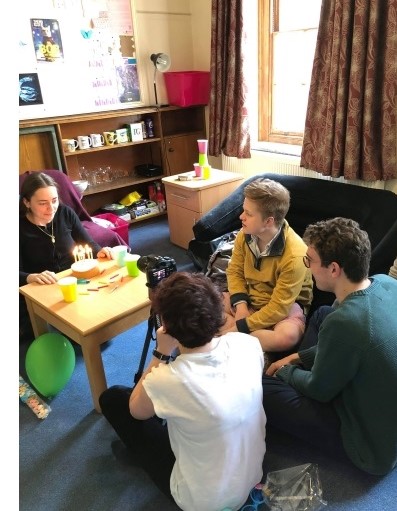
Corpus Playroom in May 2019
What do you think about the collegiate system in general?
I love the collegiate system! It means there is a big group of people you will get to know really well and spend a lot of time with both academically and socially (most English supervisions will be with other English students from your College). At Christ's, I have really grown to love both the place and the people in it.
This year I have also had supervisions which are held at other Colleges, usually a couple of hours a week, and it is really nice to get to work in buildings and rooms that you don’t usually see. I also have friends from other Colleges who I visit, and getting involved in theatre and film has allowed me to visit some great locations around Cambridge.
How did you find the application process?
I found the application process nerve-wracking but exciting, just as many people did. I felt incredibly nervous at the time, but now that the Christ's first-years are here we all look back and laugh at how tense we were! I did the ELAT (the admissions test used by Oxford and Cambridge). To prepare for this, I read over some past papers (available online) and did one or two questions from previous exams, which my English teacher marked and gave feedback on.
Was the interview what you expected it to be?
Not entirely! It was quite relaxed, as had been suggested to me - the interviews took place in the supervision rooms of various supervisors in College. However, what we actually talked about in my interviews was not quite as I had expected. There wasn’t as much focus given to my personal statement or submitted essays as I had anticipated. In my case, the interviews were far more geared towards what I was thinking at the time about things that I had read recently. However, having spoken to students in the years above me, I'm pretty sure that the content varies by year.
In order to prepare for the interviews, I read books that were completely unrelated to my A-Level English course. In my experience, interviewers like to see that your interest spans further than merely the suggested or compulsory reading for your exams! An English teacher from my high school also conducted a mock interview with me, though it was not entirely like the real thing. In terms of what I read for my personal statement and in preparation for my interviews, I tried to read older literature than that which I had previously encountered, such as The Odyssey.
My advice would be to read something you find interesting, and think about what you read. I often struggle to remember things I read long ago, so it is definitely worth making notes of any thoughts you have. It's also a good idea to briefly revisit texts you've already read if you plan on mentioning them in your personal statement – interviewers may well ask you your thoughts on them!
"Interviewers like to see that your interest spans further than merely the suggested or compulsory reading for your exams!"
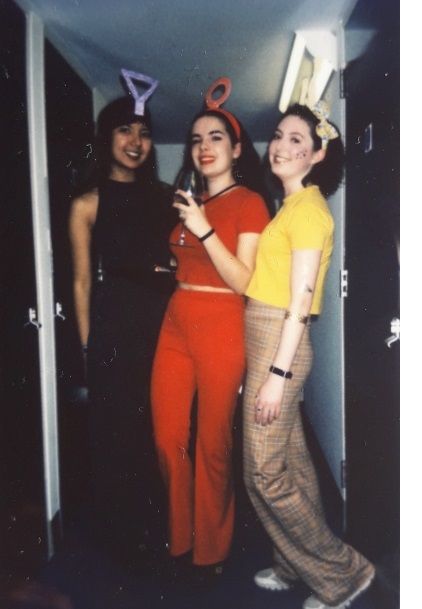
Before you came to Cambridge, what were you looking forward to?
I was really looking forward to meeting people, but also a bit worried about meeting them. I had no need to fear though, because I met some amazing people straight away. Pretty much everyone is nervous and hoping to make friends, so they're all really friendly and easy to talk to! After a few days of getting to know people I started to settle in.
Everyone helped each other out with any problems they were having – the likelihood is that if you are having a problem at the start of term, many other people will be having the same one! Going out to the freshers’ events was really useful for settling in because the more people I met and got to know, the more comfortable in College I became. The Freshers’ pack (which is posted to you around mid-September) and guidance from the College is also really useful for getting settled in, and understanding how the College operates.
How was your Freshers’ Week?
I had a great Freshers’ Week! It’s a brilliant time to go out, get to know people and explore the city before the work begins. I personally enjoyed going out in the evenings, and a highlight of the week for me was the first bop (a fancy-dress party). I still have photos from the night of me and all my friends.
"Freshers' Week is a brilliant time to go out, get to know people and explore the city before the work begins."
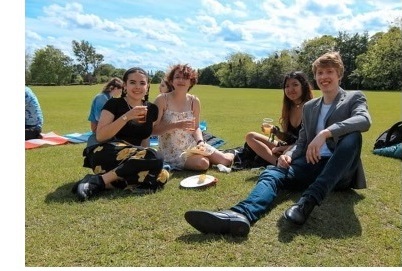 What surprised you about starting at Cambridge?
What surprised you about starting at Cambridge?
The biggest surprise was probably how many like-minded people I found. There are perceptions of Cambridge as a university filled with very serious, hard-working, unsociable students but that's definitely not the case. I’ve found so many friends who I can go out with and enjoy spending time with, both in and out of College!
The first academic week is quite intense, because we were encouraged to go to every lecture we possibly could in order to work out which lecture series we enjoyed and wanted to continue attending. I have not attended so many lectures since, so don’t worry if you feel overwhelmed at the beginning. Most of the first lectures are also geared towards how lectures themselves work and how to take notes in lectures effectively. There were also some quite scary plagiarism warnings! The supervisions were a bit daunting at first, but most supervisors try to ease you into the workload, and everyone on my course slowly got used to the system.
"There are perceptions of Cambridge as a university filled with very serious, hard-working, unsociable students but that's definitely not the case."
Is the course what you expected it to be when you applied?
Yes, but also so much better! I think there are always some areas that you'll enjoy less than others, but when I find something that really interests me, working on an essay and then discussing it in supervisions becomes very enjoyable. There are so many lectures on every week that it is impossible to attend them all, and so I only tend to go to the ones that I think look interesting or are particularly relevant to what I am studying at the time.
The workload is definitely a step up from school. Since all the work is concentrated on one subject rather than many different ones, it can feel like a lot more. Equally one or two essays a week really isn’t that much once you get used to it, especially when it’s all you have to do except for any extra reading! Practice is really is the best way to improve your thinking and essay-writing. I think the workload only begins to become a strain when you're taking on a lot of activities outside of the course.
Is there anything that you’ve struggled with in studying your course?
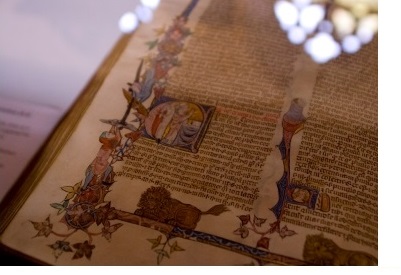
Manuscriptorium at Cambridge's University Library
I was nervous about my main paper in the first term, English Literature and its Contexts 1300-1550. I was worried that medieval literature wouldn’t be engaging and might be difficult to understand, as it's written in Middle English. However, I quickly got the hang of the complicated language and found some of the literature a lot more interesting than I had anticipated, even if that is because some of it is incredibly strange! My advice for approaching medieval literature would be to simply stick with it. After seeing the same words over and over again, you can sometimes work out their meaning without even looking it up. If you are unsure of particular words though, there are Middle English dictionaries online that can be useful if your text does not include a gloss (but I would highly recommend reading texts which include a gloss). My favourite medieval texts have been the Arthurian romances – some of the situations the knights get themselves into are completely ridiculous!
My main struggle has been balancing academic commitments with non-academic commitments. The only real solution is learning to manage your time effectively, and knowing when to say no to non-academic commitments. I try to ensure I that do not fill my week with commitments when I know I have essays and other work to do. Being able to write very apologetic emails to supervisors is also a useful skill, but one that you should perhaps avoid having to apply! I found the best way to balance my workload was to work during the day when there are often lectures or supervisions to attend anyway, and leave evenings free for socialising. I would also often work through the day on weekends, they can be very useful for writing essays since you won't have any lectures or supervisions on weekends
How is English taught at Cambridge?
I have one supervision per week for the main paper I am studying, with my supervisor and another student, where we discuss the weekly essays we write. Then, there will be one supervision per week for ‘Practical Criticism’ (a subject unique to Cambridge which is essentially very close analysis), for which there will sometimes be an essay.
The amount of lectures I attend really varies by week, depending on what series are running at the time and how useful I feel they will be to me. At times I have attended perhaps five or more in a week, and at other times just one or two. Attending lectures isn't mandatory for English because of the breadth of topics and texts available for study. There aren't specified facts and knowledge that you need to learn, because in the exam you simply write about what you want to write about. However, I would recommend attending at least one lecture from every series to see whether you find it interesting, or think it might be useful for the exam. I would highly recommend the introductory lecture series to give you an idea of what to expect from your course and from lectures, and I personally find the lectures grounded in social and historical context very useful.
We also have seminars or classes, sometimes run by the College and sometimes run by the faculty. Seminars are like supervisions but with a much larger group of students, and sometimes there will be tasks involved to be completed either within or outside of the seminar itself.
"Lectures are not essential to the English course, but I would recommend going to any that you think might be useful."
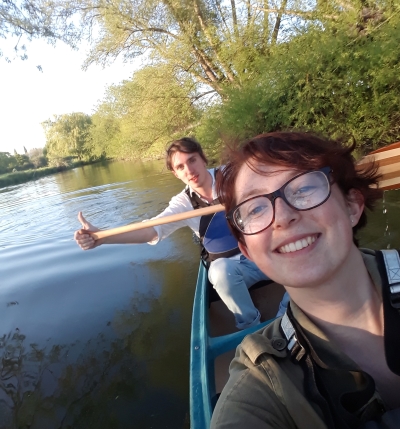
What has been your favourite topic from this year?
The third term (Easter) of this year, which is entirely devoted to studying Shakespeare, has been my absolute favourite. I thought it might get a bit tedious studying Shakespeare for a whole term, but in fact there's a huge variety of material to read and explore! Shakespeare is also quite a hot topic in terms of research, so the lecturers and supervisors tend to be incredibly passionate and engaging. Studying such well-known plays is apparently extremely useful when studying Victorian and modern literature in the second year of the course, due to the influence of Shakespeare on subsequent authors. In my first year the classes and supervisions for the Medieval and Renaissance papers were all organised by College, but in Shakespeare term we attended seminars run by the faculty, which was a good opportunity to meet English students from other Colleges.
What are your favourite, and least favourite, things about Cambridge?
My favourite things about Cambridge are the people and the vast array of opportunities on offer. My least favourite thing is that the everyday stuff is more expensive than in the North and there is only one Greggs (though Christ's is one of the nearest Colleges to it)! I tend to go home just in the holidays, as it’s too far to go during term time. I also try and visit my uni friends when I can during the breaks, though they mostly live in the South.

by John Godber, at the Corpus Playroom.
What do you do when you’re not working?
When I’m not working I’m with my friends, or getting involved in theatre and film in Cambridge. Through theatre/film commitments I have visited Clare, Fitzwilliam, Trinity Hall, Newnham, Wolfson, and numerous other Colleges and theatre spaces around Cambridge. There are amazing facilities and opportunities that I had not realised were available before I began studying here! There are two main theatres, the largest being the ADC Theatre, which also houses a great bar that stays open much later than most. There are numerous other performance spaces around Cambridge and the Colleges. I have even put on a comedy show in Christ’s very own bar, the Buttery! I would strongly encourage anyone interested in any aspect of theatre and film to get involved - I had never considered theatre as a hobby or profession before and now it is such a huge part of my life!
Additionally, I joined Christ’s Ladies' Netball team with two friends. Low-commitment College sport is a great way to keep fit and a good reason to get up on a Saturday morning!
"There are amazing facilities and opportunities that I had not realised were available before I began studying here."
What are your plans for next year?
My Director of Studies has briefed me on what compulsory papers I will be taking next year, as well as informing me of a choice between two papers I get to make, which I should be discussing with a supervisor at some point over the summer.
Next year I am living in one of a row of houses on Jesus Lane, just outside the College, that Christ’s owns. I am sharing this house with my six closest friends and am really looking forward to sharing it with them and making a home of it. I am looking forward to spending more time with my friends, meeting even more new people and throwing myself into even more amazing opportunities!
August 2019
Please be aware if you're considering an application that our student writers describe their experiences. Although the majority of the information stays the same, some details may change from year to year. Do read the student profiles in combination with our undergraduate admissions pages for full information.
Back to Student profiles / English at Christ's / English Taster Day / Next: Esme's profile


